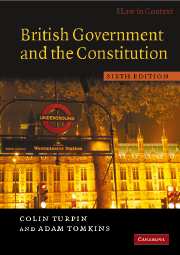Book contents
- Frontmatter
- Contents
- Preface
- Acknowledgements
- Abbreviations
- Table of Cases
- Table of Statutes
- Table of European Treaties
- Part I Constitution, state and beyond
- Part II Government
- Part III Accountability
- 8 Parties, groups and the people
- 9 Parliament and the responsibility of government
- 10 The courts: judicial review and liability
- Part IV Liberty
- Index
9 - Parliament and the responsibility of government
Published online by Cambridge University Press: 05 June 2012
- Frontmatter
- Contents
- Preface
- Acknowledgements
- Abbreviations
- Table of Cases
- Table of Statutes
- Table of European Treaties
- Part I Constitution, state and beyond
- Part II Government
- Part III Accountability
- 8 Parties, groups and the people
- 9 Parliament and the responsibility of government
- 10 The courts: judicial review and liability
- Part IV Liberty
- Index
Summary
Introduction: responsible government
Our constitutional system is one of ‘responsible government’. The idea of political (or constitutional) responsibility is wide enough to include a number of values (no fewer than twelve are identified by Gilbert, ‘The framework of administrative responsibility’ (1959) 21 The Journal of Politics 373), but in the present context two are of particular importance. The first is indicated by AH Birch, Representative and Responsible Government (1964), pp 17–18, in saying that ‘the term “responsible” is commonly used to describe a system of government in which the administration is responsive to public demands and movements of public opinion’. The responsibility of government in this sense implies that it is responsive to (takes heed of, defers to) demands, pressure or influence exerted by the public, or on its behalf by institutions or organisations that have an acknowledged place in the constitutional system. We may take the correlative of ‘responsiveness’ to be ‘control’, so that a responsive government is one that submits to control by the public or by representative bodies. ‘Control’ is a central concept of constitutional thought and practice, and it needs some elucidation.
A dictionary definition of control gives as synonyms ‘command’, ‘restraint’ and ‘a check’, and it is evident that the word may be used in strong or weak senses. Even mere influence can be thought of as a relative power, or control in a weak sense, so that control extends in a series from a power of direction at one extreme to inducement or influence at the other.
- Type
- Chapter
- Information
- British Government and the ConstitutionText and Materials, pp. 565 - 653Publisher: Cambridge University PressPrint publication year: 2007

